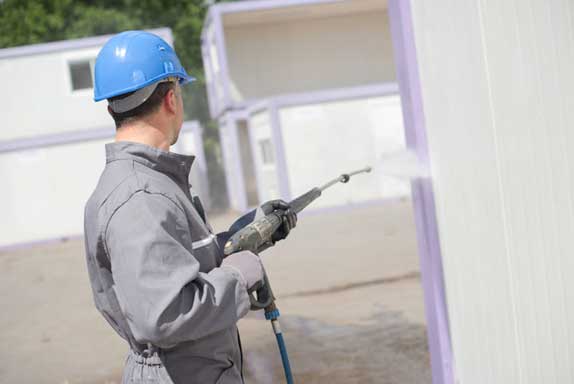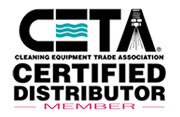If you plan to invest in a pressure washer to help clean up your business or perform other important tasks, then you need to learn about pressure washer safety. Commercial pressure washers are much more powerful than those sold at home supply stores, and their extra power can make them more hazardous if you do not take steps to protect yourself while using one.
Read on to learn four important pressure washer safety tips, and be sure to pass them onto your employees, co-workers, and anyone else who will use your new pressure washer.

1. Choose the Right PSI Setting for the Job
You likely know that a pressure washer nozzle projects water with extreme force. However, you may not realize just how powerful a pressure washer stream can be. The power of the stream of water from a pressure washer is measured in pounds-per-square-inch (PSI). Many pressure washers on the market today are capable of producing streams of water with up to 4,000 PSI of pressure or even more.
A stream just over 1,000 PSI can puncture human skin, while a stream just over 1,700 PSI can punch a hole in concrete.
Typically, you control the PSI of the stream of water that your pressure washer emits by changing the pressure washer nozzle. However, some pressure washers are equipped with variable PSI nozzles that allow you to adjust the PSI without changing the nozzle.
Choose the nozzle that projects the water with the lowest PSI you need to perform the job at hand to reduce the chance of harming yourself or the item you are cleaning.
The red 0˚ nozzle projects water in a straight stream that is the most powerful stream the machine will emit. This nozzle should only be used when cleaning inside of cracks and crevices and performing other tasks that cannot be achieved with other nozzles. A 15˚ yellow nozzle is powerful enough to strip paint off a surface or perform a heavy-duty concrete cleaning task.
A 25˚ green nozzle can be used for lighter cleaning tasks, while a 40˚ white nozzle is a good option for cleaning more fragile surfaces, such as windows.
2. Wear the Right Clothing and Safety Gear
Since it takes just over 1,000 PSI of water pressure to puncture human skin, be sure to always wear protective clothing and safety gear when performing any pressure washing job and have anyone in the area where the pressure washing is being performed wear similar gear.
This safety gear should include a waterproof protective suit, protective gloves, and waterproof safety boots. In addition, be sure to wear a protective helmet, a full face visor, and a good pair of safety goggles.
While this protective gear will not protect you from all pressure washer accidents, it can help limit the damage inflicted on you or a staff member if one were to occur.
3. Plug an Electric Unit Directly into a GFCI Power Outlet Whenever Possible
Plug your pressure washer directly into an electrical outlet equipped with a ground fault circuit interrupter (GFCI) whenever it is possible. If an electrical short circuit occurs while pressure washing, this outlet will immediately stop pumping electricity through your pressure washer cord to prevent electrocution.
However, if you simply cannot perform a job without using an extension cord, then you must choose this extension cord wisely to avoid electrocution and damage to your pressure washer unit. First, check the machine’s manufacturer’s instructions to see if the manufacturer recommends a certain extension cord type that is most compatible with the machine or if they suggest to avoid use of an extension cord altogether.
If the manufacturer’s instructions do not designate a compatible extension cord, then choose a cord that is less than 25 feet in length and at least 14 gauge in weight. A cord that is too long can create dangerous power surges, and an extension cord that is lighter than 14 gauges may not provide your machine with enough steady power.
4. Never Use a Gas-Powered Pressure Washer in an Enclosed Area
While gasoline-powered pressure washers do have their unique advantages, they should never be used in an enclosed area or room. Just like all gas engines, the engine of a gasoline-powered pressure washer emits carbon monoxide. Carbon monoxide is a colorless, odorless gas that can lead to death if inhaled.
To play it safe, purchase an electric pressure washer if you plan to use your new cleaning equipment indoors. If you purchase a gasoline-powered pressure washer that you plan to use outdoors only or in a very well-ventilated area, be sure to warn your staff members to never use the pressure washer in an enclosed area and place a warning label on the machine that states its hazards.
Follow these important pressure washer safety tips and be sure to share them with all staff members who will use your new pressure washing machine. Check out the pressure washer selection at Bens Cleaner Sales Inc. today, and contact the staff if you have any additional pressure washer safety questions.

